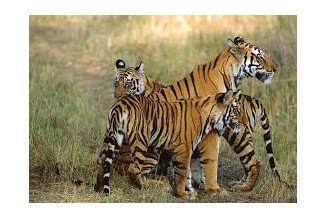Zool
ogy is a fascinating and diverse field within biology that focuses specifically on the study of animals. It plays a crucial role in conservation in understanding animal populations and their habitats, which is essential for protecting endangered species. In medicine, studying animal physiology can provide insights into human health and disease. Environmental science contributes to our understanding of ecosystems and the impact of human activities on the environment. In agriculture, knowledge of animal nutrition and behaviour is important for animal husbandry.
Introduction to the Zoology Department
The Department of Zoology, established in 1946, is one of the oldest and most prestigious academic units of the B.P. Baria Science Institute. Recognized under the heritage category, the department holds immense historical, academic, and architectural value. It distinguished academic entity recognized for its valuable specimens and archives. This report details the department's history, current activities, unique features, and development.
The department offers undergraduate, postgraduate, and doctoral programs in Zoology. In 1947, the Department of Zoology began offering a P.G. course in Zoology. Due to certain circumstances, the department had to close the course. However, the same course was started in a department once again in 2021. The faculty of a department plays a pivotal role in shaping the academic and professional growth of its students. With an average of 30 years of undergraduate teaching experience and 10 years of graduate teaching experience, our staff are skilled and knowledgeable educators. The majority of faculty members have taught at the postgraduate level, which advances research and learning. By winning gold medals and rankings, our students have continuously shown their excellence in both academics and extracurricular activities over the years. Some of the faculty are members of the academic council, zoology board members, research review committee, Ph.D. supervisor, paper setters, and evaluators at Veer Narmad South Gujarat University. In recent years, faculty members have shown a growing interest in emphasizing academic contributions through paper publication, book writing, and involvement in research projects.
Its curriculum is designed to balance classical studies with modern research. As part of it, every year, the educational excursion was organized to provide students with hands-on exposure to real-life working environments. The trip was carefully planned to align with the academic objectives of our course and included visits to relevant institutions such as animal collections, animal conservation centres, national parks, sanctuaries, and research centres. Moreover, dissertations are provided under the guidance of faculty mentors, students are encouraged to choose a subject of interest related to their discipline, and conduct extensive research using various methodologies. This project allows students to develop skills in academic writing, research techniques, and independent study, while also contributing original knowledge or perspectives to the field. The department actively engages through seminars, nature walks, exhibitions, and conservation awareness programs.
Career opportunities for zoology graduates and postgraduates: Zoology graduates and postgraduates have a wide array of career opportunities spanning various sectors. Here's a breakdown of potential paths:
• Zoologist: Researching animal behaviour, ecology, physiology, and evolution, working in research institutions, universities, or conservation organizations.
• Wildlife Biologist/Conservationist: Studying animal populations and their habitats, developing and implementing conservation strategies, working for government agencies, NGOs, or wildlife reserves.
• Ecologist: Analyzing the interactions between organisms and their environment, conducting environmental impact assessments, working for environmental consulting firms or government agencies.
• Marine Biologist: Studying marine organisms and ecosystems, conducting research on marine biodiversity and conservation, working for research institutions, aquariums, or marine conservation organizations.
• Zookeeper/Aquarist: Caring for animals in zoos or aquariums, managing animal health, nutrition, and behavior, and educating the public about animal conservation.
• Animal Nutritionist: Analyzing the nutritional needs of animals, creating dietary plans for animals in various settings, working for animal feed companies, zoos, or research institutions.
• Research Scientist: Conducting laboratory or field research on animal-related topics, working in universities, research institutions, or pharmaceutical companies.
• Environmental Consultant: Providing expert advice on environmental issues, conducting environmental impact assessments, working for consulting firms or government agencies.
• Environmental Education Officer: Developing and delivering educational programs about animals and the environment, working for schools, museums, or nature centres.
• Veterinary Field: Veterinary nurse or technician, with further study, a veterinary surgeon.
• Education: Teaching biology or zoology at various levels, working in museums or science centres.
• Research and Development: Working in pharmaceutical or biotechnology companies.
• Government Agencies: Working for agencies involved in wildlife management, environmental protection, or public health.
• Non-Governmental Organizations (NGOs): Working for organizations focused on animal welfare or conservation.
• Forensics: Some zoology background can be useful in certain forensic science applications.
• Postgraduate Degrees: A Master's or Ph.D. can open doors to more advanced research and academic positions.
• Specialized Skills: Skills in areas like GIS, data analysis, or specific laboratory techniques are highly valuable.
DEPARTMENT OF ZOOLOGY (ESTD.1946)
Sr.No. NAME FROM TO
1. PROF. P.B. MENON 1946 1972
2. Prof. N.D. CHHAYA 1972 1974
3. PROF.U. M. RAVAL 1976 1978
4. PROF. R. K. PATEL 1978 1995
5. PROF.S. R. PATEL 1995 2001
6. PROF.D.R. CHHATWANI 2001 2002
7. DR. A. I. SHAH 2002 Continues
